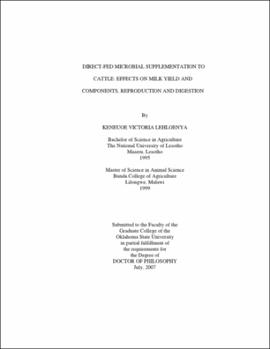| dc.contributor.advisor | Spicer, Leon J. | |
| dc.contributor.author | Lehloenya, Keneuoe Victoria | |
| dc.date.accessioned | 2013-11-26T08:22:35Z | |
| dc.date.available | 2013-11-26T08:22:35Z | |
| dc.date.issued | 2007-07 | |
| dc.identifier.uri | https://hdl.handle.net/11244/6604 | |
| dc.description.abstract | Scope and Method of Study: This study was undertaken to determine the effect of manipulating ruminal fermentation via direct feeding of yeast, propionibacteria or their combination to cattle on milk yield and components, reproduction and digestion. Experiment 1: From two wk prior to parturition to 210 d postpartum, 31 primi and multiparous Holstein cows were allocated to three treatments: Control fed corn based silage TMR; XPY, fed control TMR + yeast culture ; P169+XPY, fed control+XPY+P169. Daily milk yield was recorded and milk samples were analyzed for fat, protein, lactose, solids corrected fat, urea nitrogen, and somatic cell counts. Blood samples were analyzed for progesterone concentrations. Experiment 2: Twelve ruminally and duodenally cannulated steers were assigned to one of the four treatments as described above including, P169 group, fed Control plus P169. Duodenal, ruminal, fecal and blood samples were collected. Intake, ruminal and total tract digestibilities, duodenal flow, fermentation profile, ruminal kinetics and plasma glucose and insulin were measured. | |
| dc.description.abstract | Findings and Conclusions: Feeding P169+XPY increased milk production by 8-12% , but only 3-5% above XPY-fed cows. P169+XPY fed MP cows had significantly greater milk glucose and lactose percentage than Control and XPY-fed MP cows. Plasma insulin concentrations were greater in P169+XPY than XPY and Control-fed MP cows. The XPY fed MP and Control PP cows exhibited a greater recovery of wk 1 BW. There was no significant difference in average days to first ovulation among all groups. We conclude that increased milk production from P169+XPY supplementation via alterations in milk glucose and plasma insulin had no adverse effect on reproductive performance. Experiment 2: Organic matter, NDF, ADF and N intakes were decreased by feeding XPY. However, nutrient flow, ruminal nutrient NDF digestibilities were not affected by dietary treatments. XPY fed steers alone increased total tract nutrient digestibility. Feeding P169 increased propionate by 14% and decreased acetate: propionate concentrations. These results suggest that feeding P169 might alter ruminal metabolism toward increased propionate without affecting feed intake, nutrient digestibilities, duodenal flow, rumen kinetics or microbial nitrogen flow. | |
| dc.format | application/pdf | |
| dc.language | en_US | |
| dc.rights | Copyright is held by the author who has granted the Oklahoma State University Library the non-exclusive right to share this material in its institutional repository. Contact Digital Library Services at lib-dls@okstate.edu or 405-744-9161 for the permission policy on the use, reproduction or distribution of this material. | |
| dc.title | Direct-fed microbial supplementation to cattle: Effects on milk yield and components, reproduction and digestion | |
| dc.contributor.committeeMember | Payton, Mark E. | |
| dc.contributor.committeeMember | Krehbiel, Clinton R. | |
| dc.contributor.committeeMember | Horn, Gerald W. | |
| osu.filename | Lehloenya_okstate_0664D_2350.pdf | |
| osu.accesstype | Open Access | |
| dc.type.genre | Dissertation | |
| dc.type.material | Text | |
| thesis.degree.discipline | Animal Nutrition | |
| thesis.degree.grantor | Oklahoma State University | |
